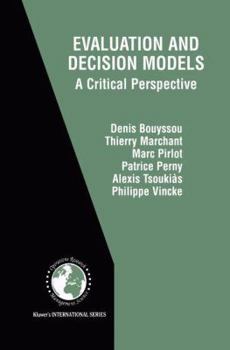Evaluation and Decision Models: A Critical Perspective
Select Format
Select Condition 
Book Overview
1. 1 Motivations Deciding is a very complex and difficult task. Some people even argue that our ability to make decisions in complex situations is the main feature that distinguishes us from animals (it is also common to say that laughing is the main difference). Nevertheless, when the task is too complex or the interests at stake are too important, it quite often happens that we do not know or we are not sure what to decide and, in many instances, we resort to a decision support technique: an informal one-we toss a coin, we ask an oracle, we visit an astrologer, we consult an expert, we think-or a formal one. Although informal decision support techniques can be of interest, in this book, we will focus on formal ones. Among the latter, we find some well-known decision support techniques: cost-benefit analysis, multiple criteria decision analysis, decision trees, . . . But there are many other ones, sometimes not presented as decision support techniques, that help making decisions. Let us cite but a few examples. - When the director of a school must decide whether a given student will pass or fail, he usually asks each teacher to assess the merits of the student by means of a grade. The director then sums the grades and compares the result to a threshold. - When a bank must decide whether a given client will obtain a credit or not, a technique, called credit scoring, is often used.
Format:Paperback
Language:English
ISBN:1461356318
ISBN13:9781461356318
Release Date:October 2012
Publisher:Springer
Length:274 Pages
Weight:0.90 lbs.
Dimensions:0.6" x 6.1" x 9.2"
Customer Reviews
0 rating





